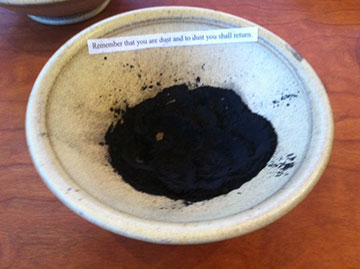Ash Wednesday Reflection: Public Ashes, Private Anguish
Ashes distributed at an Ash Wednesday liturgy in
Regina Chapel today.
So.... What are we doing here?
I've often asked myself this question on Ash Wednesday. When I was a kid, I always thought it set me up for a bum rap. I mean, here's my mom, harping at me to keep clean all the time, and then I go to church and they smear black dirt all over my head.
To make it worse, I didn't to Catholic school, and there weren't many Catholics kids in my grade. So when my Mom made sure we all got up at the crack to get these nice black smears on our heads, we did not love it. I mean, it was a Mean Girl's dream come true.
"Ew! Your head is dirty!" "Ew! Don't you bathe at your house?"
There was clearly nothing to do but assume a level of Pride:
"I am a Roman Catholic!" I said. "It's Ash Wednesday. THESE are my ASHES." I came to love this air of nobility. For once, I was exotic. For once, I was weird for a GOOD reason.
That may have been an age-appropriate response for an eighth grader. But it is hypocrisy for an adult. Taken together, our two readings today help us understand why.
While Joel calls us to a public display of repentance in community, Jesus pulls us in the opposite direction: To a private, intimate experience of God's mercy.
Joel urges us - not to waste a minute, "to Blow the trumpet in Zion!
proclaim a fast,
call an assembly;
Gather the people,
notify the congregation;
Assemble the elders... " (Joel 2:15-16)
This is an urgent call to change our lives, to break the habit of getting caught up in the flow of the "busyness" of our lives, where we are tempted to be content with making excuses for our failings.. Joel wants us to STOP, and identify where we have failed God, ourselves, and our community. And to do so publicly.
But somehow, this public display became distorted into something God never wanted.
And a just few centuries later, Jesus calls us on this distortion: He draws us away from a public display of repentance, to a quieter, more intimate reception of God's mercy.
"Yeah, don't blow the horn," he says. "Meet God in secret. Tell him your sins, secretly. "And your Father who sees in secret will repay you." (MT 6: 2,4)
And yet, here we are, about to take on what seems like a public display. What do these ashes mean?
We might begin our exploration of this symbol by examining basic symbolic behavior. We humans know we are different from all other species that fly or walk or crawl - in that we are capable of using symbols... Indeed, whole SETs of symbols, which we call Languages.
There's nothing in this lectern that makes it a lectern. "Lectern" is a symbol, a name which we who use the symbol set known as "English" agree upon.
We might have named it "cat." Or "book". Or "car." It does not matter; it's entirely arbitrary. Meaning lies in the senders and receivers of the message.
In order for you to understand me, I must encode my message, using symbols I know you understand -words, gestures, inflection - so that you can decode these symbols and together, we can make meaning.
But what about God? Does God need me to encode? Of course not. God knows my heart, my mind, my soul, my every need.
Of course, He understands my need to encode and decode. He understands that, as his human creation, it's what I do.
So these ashes I take are a symbol - I need it, he doesn't - by which I encode my deep sorrow for my failings. In the sign of the cross in ashes, I declare aloud, publicly --- not that I am a holy person - just the opposite. I declare by these ashes that I begin right here, right now. YOU declare by these ashes that YOU begin right here, right now.
So that's another thing these ashes communicate - that every one of us in this community is starting from the same place: OVER. Our ashes speak this truth: that I am no holier, nobler, or more worthy of God's love than anybody else -- even those in prison who are guilty of the worst crimes.
Our ashes tell God we understand this, we believe this, we embrace this. Rather than wearing our ashes to proclaim our sanctity - as I did when I was a child - we wear them to acknowledge that we need God's Mercy now, today, as never before.
My friends, as we accept our ashes today, let us do so understanding that where there is a sender of a message, there must be a receiver. This receiver saves us from that bitter accuser who would have us live in shame, apart from God.
When we take our ashes today, we send a message to our Father:
I know who you are. I know you are with me. Like everyone else in my community, I begin again in your grace. I trust completely in your Mercy. And I believe - with all my heart - that you love the work of your hands.
Then let us begin.
~A reflection offered at the afternoon Ash Wednesday liturgy in Regina Chapel by Susan Baxter, faculty, Communication Studies, Dance, and Theatre. February 18, 2015

